Astronomy Photographer of the Year: Huge plasma arc wins
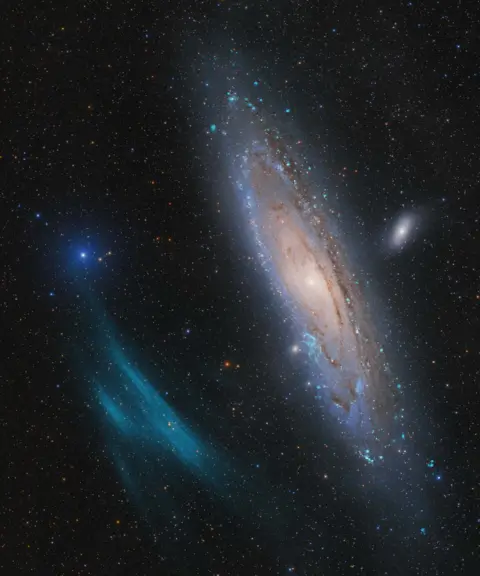 Marcel Drechsler, Xavier Strottner, Yann Sainty
Marcel Drechsler, Xavier Strottner, Yann SaintyA photo of a huge plasma arc next to the Andromeda Galaxy has won this year's prestigious photography prize.
A team of amateur astronomers led by Marcel Drechsler, Xavier Strottner and Yann Sainty captured the surprising discovery.
Scientists are now investigating the newly discovered giant cloud of gas.
It could be the largest such structure in the nearby environment in the Universe.
Judge and astrophotographer László Francsics said the image was as spectacular as it was valuable.
"It not only presents Andromeda in a new way, but also raises the quality of astrophotography to a higher level," he said.
The Royal Observatory Greenwich in London, which runs the Astronomy Photographer of the Year competition, also awarded two 14-year-old boys from China the Young Astronomy Photographer of the Year prize.
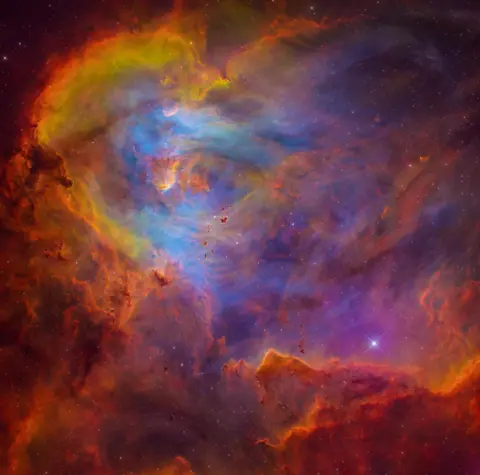 Runwei Xu, Binyu Wang
Runwei Xu, Binyu WangRunwei Xu and Binyu Wang collaborated to capture this image of The Running Chicken Nebula, IC 2944, which is located in the constellation of Centaurus, 6,000 light years away from the Earth.
Embedded in the nebula's glowing gas, the star cluster Collinder 249 is visible.
Yuri Beletsky, judge and professional astronomer, described it as a strikingly beautiful picture.
"The photographers have managed to capture the vibrant colours of the nebula as well as the embedded star cluster."
The Young Astronomy Photographer of the Year award is for people aged under 16.
The judges looked at more than 4,000 entries from around the world.
The images are on show in an exhibition at the National Maritime Museum in London from Saturday.
See more of the winning and highly commended images:
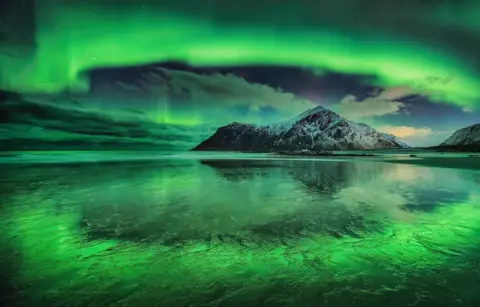 Andreas Ettl
Andreas EttlThis image by Andreas Ettl shows the Northern Lights reflected on Skagsanden beach, Lofoten Islands, Norway.
The mountain in the background is Hustinden, which the aurora appears to encircle.

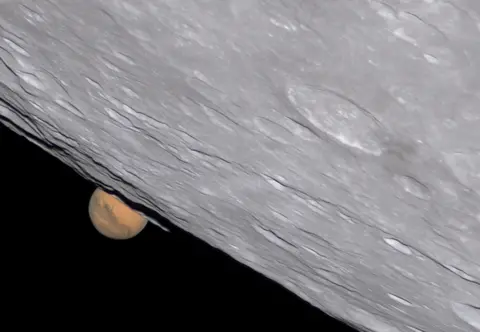 Ethan Chappel
Ethan Chappel Ethan Chappel captured this image, from Cibolo, Texas, USA, of an occultation of Mars that took place on 8 December 2022.
During the occultation, the Moon passed in front of the planet Mars, which allowed the photographer to capture both objects together.
The image shows Mars behind the Moon's southern side in impressive detail.

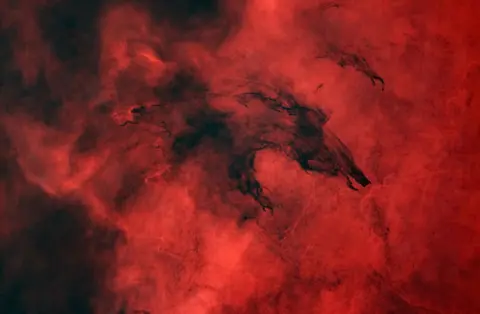 James Baguley
James BaguleyThis image, taken from Canberra, Australia, shows a dark, thick molecular cloud in the form of a wolf, known as the Wolf Nebula or Fenrir Nebula.
The photographer, James Baguley, chose a starless image to emphasise the beautiful red background, which is a dense backdrop of hydrogen gas.

 Eduardo Schaberger Poupeau
Eduardo Schaberger Poupeau Eduardo Schaberger Poupeau made this picture of the Sun from Rafaela, Santa Fe, Argentina.
It shows a huge filament in the shape of a question mark. Solar filaments are arcs of plasma in the Sun's atmosphere given shape by magnetic fields. The photo is a mosaic of two panels.

 Angel An
Angel AnSprites are an extremely rare phenomenon of atmospheric luminescence that appear like fireworks.
Angel An captured this photograph from the highest ridge of the Himalaya mountains at Lake Puma Yumco, Tibet.

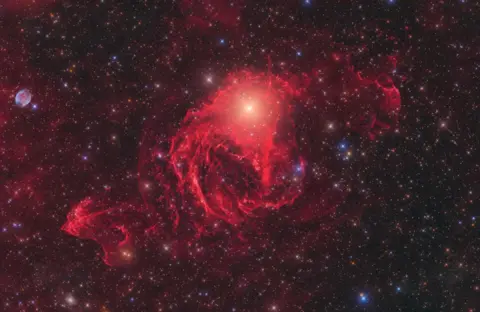 Marcel Dreschsler
Marcel DreschslerAnother of the judges' favourite images was by Marcel Dreschsler. The photograph captures a previously unknown galactic nebula containing a pair of stars surrounded by a common envelope, adding another exciting discovery to the winning images.

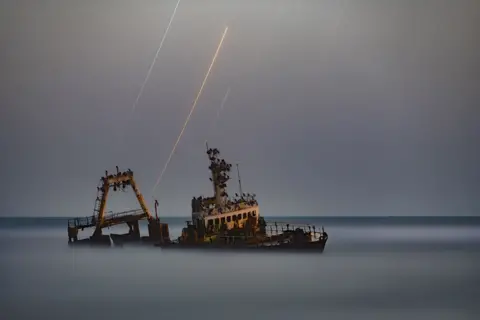 Vikas Chander
Vikas ChanderThe most northerly part of Namibia's Atlantic-facing coast is one of the most treacherous coastlines in the world, and has gained the name the Skeleton Coast.
The ship in this photo, Zeila, was stranded on 25 August 2008 and is still in a well-preserved state.
The image, taken by Vikas Chander, shows the delicate colours of different star types in the sky above the wreck.

 Marco Lorenzi
Marco LorenziAn image of Jupiter 30 minutes after it crossed the meridian was taken from Singapore by Marco Lorenzi.
The Great Red Spot and many details of the turbulent atmosphere, primarily composed of hydrogen and helium gas, are clearly visible, including several smaller storms.

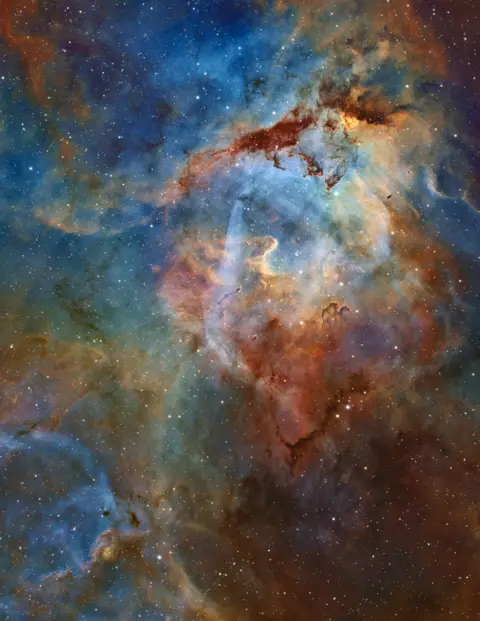 Aaron Wilhelm
Aaron WilhelmThe Sh2-132 complex lies near the border of the Cepheus and Lacerta constellations and contains several deep sky structures.
The photograph by Aaron Wilhelm, includes 70 hours of data, and the rich interplay of all the gasses reveals something different each time you look at it.

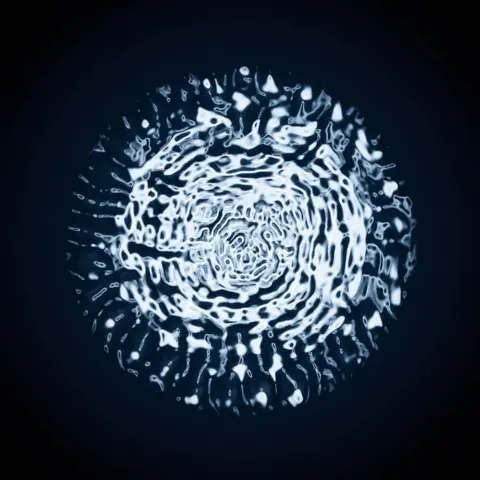 John White
John WhiteTaking audio source material from Nasa's Chandra Sonification Project (Nasa Chandra X-Ray Observatory, May 2022), John White visually captured the sound of the black hole at the centre of the Perseus Galaxy.
The audio was played through a speaker on to which White attached a petri dish, blacked out at the bottom and then filled with about 3mm (0.11in) of water.
Using a macro lens and halo light in a dark room, White experimented with the audio and volumes to explore the various patterns made in the liquid.
All images subject to copyright.
